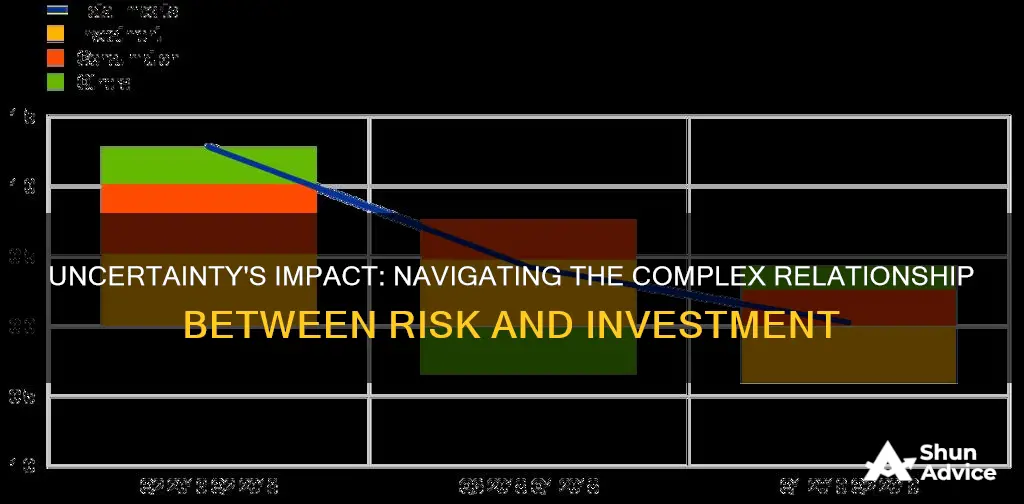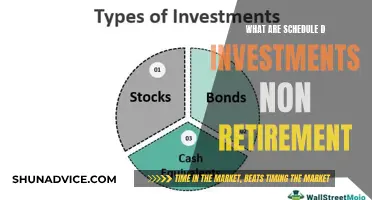
Uncertainty can have a significant impact on investment decisions, and there are mixed views on whether it increases or decreases investment. On the one hand, rising uncertainty can cause investors to delay investments and move their capital to safer assets, such as precious metals and government bonds, leading to a depreciation of the stock market. This is particularly true during times of war, recession, or other negative events.
On the other hand, some investors may view uncertainty as an opportunity to invest in new capabilities and gain a long-term advantage. They adopt strategies such as sensemaking, bootstrap ethics, and stakeholder balance to navigate through uncertain times. Additionally, uncertainty about future economic conditions can lead to more cautious behaviours, with households reducing consumption and investing less in risky financial investments.
Overall, while uncertainty can cause investors to be more cautious, it can also present opportunities for those willing to take calculated risks.
What You'll Learn

Uncertainty and investment in the airline industry
Uncertainty is challenging for any industry, and the airline industry is no exception. The COVID-19 pandemic has brought about a period of unprecedented uncertainty for airlines, with travel restrictions, reduced demand, and operational challenges. This uncertainty has had a significant impact on investment decisions and strategies within the industry.
The airline industry is characterised by intense competition, high operating costs, and vulnerability to external factors such as fuel prices, labour shortages, and geopolitical risks. These factors create a challenging environment for investment even without the added layer of uncertainty brought about by the pandemic.
During times of uncertainty, investors tend to move their capital from equities to safer assets, such as precious metals, government bonds, and money-market instruments. This shift can cause depreciation in the stock market and impact the financial health of airlines, making it more difficult for them to secure investments. Additionally, uncertainty affects the ability of airlines to forecast demand accurately, which is crucial for making informed investment decisions.
However, uncertainty can also present opportunities for investment. For example, during the pandemic, Alaska Airlines took advantage of the situation by updating and expanding its fleet at attractive prices. The company's leaders recognised the opportunity to streamline operations and secure their position for the future. This strategy set them apart from their competitors, who were primarily focused on cost-cutting measures.
To navigate uncertainty effectively, airline industry leaders need to adopt specific mindsets. These include sensemaking, which involves taking small steps to understand the environment and adjust strategies as needed; a bootstrap ethic, which means spending money wisely and prioritising essential investments; and a commitment to stakeholder balance, which entails working collaboratively with employees, suppliers, investors, and communities to share risks and rewards.
By embracing these mindsets and staying well-informed about market trends and conditions, airline industry leaders can make prudent investment decisions even during uncertain times. Diversification is also a key strategy, as spreading investments across various assets, regions, and sectors can help mitigate risks and soften the impact of depreciation in any one area.
In conclusion, while uncertainty can pose challenges for investment in the airline industry, it also presents opportunities for those who can navigate it effectively. Leaders who adopt a thoughtful and strategic approach, balancing cost-cutting with smart investments, will be best positioned to emerge stronger from periods of uncertainty.
Starbucks Stock: Buy or Bye?
You may want to see also

The impact of uncertainty on household economic behaviour
Uncertainty can have a significant impact on household economic behaviour, influencing everything from consumption patterns to investment decisions. Here are some key ways in which uncertainty can affect households:
Consumption and Spending
Uncertainty about future income and economic conditions can lead to a decrease in household spending. Households may become more cautious and choose to save more rather than spend on non-essential goods and services. This was particularly evident during the Covid-19 pandemic, where individuals were uncertain about their future work prospects, incomes, and the overall economic outlook.
Investment Decisions
Household investment behaviour can also be influenced by uncertainty. Individuals with higher levels of uncertainty are often less likely to invest in risky assets, such as equities, and may opt for more conservative investments. This is supported by research that found a negative relationship between uncertainty and participation in equity markets, with individuals holding a smaller fraction of their assets in stocks.
Credit and Borrowing
Uncertainty can also impact a household's credit and borrowing behaviour. More uncertain households may seek additional credit access or lines of credit as a precautionary measure. This can be a way to ensure financial stability in the face of uncertain income or economic conditions.
Impact on Overall Economic Activity
The impact of uncertainty on household behaviour can have broader consequences for the economy. When households reduce spending, it can lead to lower demand for goods and services, potentially affecting firms' investment and hiring decisions. This, in turn, can contribute to slower economic growth and higher unemployment.
Policy Interventions
Policy interventions and messages aimed at influencing economic behaviour may have varying effects on households depending on their level of uncertainty. Households with higher economic uncertainty may be more cautious in their response to policy changes, especially if they belong to lower socioeconomic groups. Reducing economic uncertainty through clear policy measures and interventions can help mitigate some of these impacts.
Overall, uncertainty can significantly influence household economic behaviour, leading to more cautious spending, investment, and borrowing decisions. These choices can have ripple effects throughout the economy, underscoring the importance of addressing and managing economic uncertainty.
Investing to Own: Strategies for Paying Off Your Home
You may want to see also

Uncertainty and investment in times of war
Uncertainty is a common feature of the global economy, and it can be challenging for investors to navigate. This challenge is amplified during times of war, which introduce a range of unique complexities and risks.
During times of war, investors often experience heightened uncertainty due to the unpredictable nature of conflict. This uncertainty can manifest in several ways. Firstly, there is often a sharp sell-off in stocks as investors move their money to safer assets, such as precious metals, government bonds, and money-market instruments. This shift can cause a depreciation of the stock market. Additionally, war can disrupt global supply chains and increase demand for certain commodities, leading to volatile prices. For example, a country that supplies a large portion of the world's oil going to war can cause uncertainty about the level of global oil reserves, leading to increased oil prices.
The impact of war on investments can vary depending on the specific circumstances. If a war starts unexpectedly, it tends to decrease stock prices. On the other hand, if there is a prewar phase, an increased likelihood of war may decrease stock prices, but the ultimate outbreak can lead to an increase. This phenomenon, known as "the war puzzle," remains unexplained.
While war can cause initial downturns in the stock market, markets have historically shown resilience and often recover quickly as the conflict stabilizes or its scope becomes clearer. In some cases, markets have even risen during wartime. For example, the Dow rose over 50% during World War II, and stocks have generally shrugged off geopolitical conflicts, according to LPL Financial research.
To navigate investments during times of war, investors should aim to stay well-informed and adjust their investment strategies as events unfold. Diversification is a key tactic, as it helps to mitigate the impact of losses in any one area of a portfolio. Investing in different regions, sectors, and industries can provide a buffer against risks associated with specific conflicts. For example, investing solely in oil companies carries a high risk if oil prices drop due to a war, but having investments in the technology or renewable energy sectors can balance this risk.
While it is challenging to commit capital during uncertain times, it can also present opportunities for investors who position themselves well. Those who can take advantage of these opportunities may reap significant rewards in the long run.
Maximizing Your Sponsored Retirement Plan: A Guide to Strategic Investing
You may want to see also

The role of policy interventions in reducing uncertainty
Uncertainty is a natural part of investing, but when it increases significantly, it can confuse even well-informed investors. During times of uncertainty, investors tend to move their money from equities to safer assets, such as precious metals, government bonds, and money-market instruments. This can cause the stock market to depreciate.
Uncertainty impacts the economy on both a micro and macro level. On a micro level, it affects individual companies and their ability to predict future earnings, which can lead to layoffs and decreased investment. On a macro level, uncertainty can affect global oil prices and the flight of capital, causing exchange rate devaluation.
Policy interventions can play a crucial role in reducing uncertainty and mitigating its negative economic effects. Here are some ways in which policy interventions can help:
- Clear policy statements: Governments can make clear and transparent statements about their policies and intentions. This reduces uncertainty for individuals, businesses, and investors, helping them make more informed decisions.
- Providing insurance: Governments can provide insurance and safety nets to protect individuals and businesses from the full impact of economic downturns. For example, unemployment benefits can provide a floor for income loss, while programs like the NHS in the UK can offer healthcare insurance.
- Targeted spending and tax adjustments: Governments can use fiscal policy tools to alleviate the effects of uncertainty. For example, they can provide targeted spending to support affected industries and individuals. Additionally, tax adjustments can be made to encourage investment and economic activity.
- Reducing policy uncertainty: While it is impossible to eliminate all economic uncertainty, governments can reduce policy uncertainty by having clear policy objectives, well-thought-out plans, and specific guiding principles. This helps businesses and individuals understand how policies will react to different economic scenarios.
- Infrastructure investment: Infrastructure investment can be used to invigorate growth, limit economic scarring, and address other goals such as climate change. Synchronized infrastructure investment across multiple countries can be particularly effective in boosting the economy.
- Support for developing nations: Multilateral efforts are crucial to helping the poorest economies during times of uncertainty. This can include providing financial support, removing trade restrictions, and ensuring access to medical solutions like vaccines and treatments.
- Avoid premature withdrawal of policy support: During times of uncertainty, it is important to avoid withdrawing policy support too early. This includes maintaining or increasing fiscal support, monetary accommodation, and liquidity measures to ensure the flow of credit, especially to small and medium-sized businesses.
Eurozone's Financial Investment Impact: Navigating the Monetary Waves
You may want to see also

The effects of uncertainty on firm hiring and investment
Uncertainty can have a significant impact on firm hiring and investment, and there is a wide debate on how uncertainty affects firm behaviour. Uncertainty can be caused by various factors, such as the Covid-19 pandemic, wars, recessions, and other negative events. These events can make it challenging for individuals, organisations, and governments to plan for the future with confidence.
During uncertain times, firms may delay investments, research projects, or hiring decisions until the economic outlook becomes clearer. This wait-and-see approach, often referred to as "the option value of waiting", can lead to a decrease in capital investment and hiring. For example, during the Covid-19 pandemic, firms faced uncertainty about their future path, leading to a reduction in investment and hiring activities. This effect was particularly pronounced in the accommodation and food industries, which rely heavily on social interactions.
Uncertainty can also increase financial costs for firms, as investors demand higher compensation for lending or investing due to the higher risk. This increase in financial costs can further deter firms from investing or hiring. Additionally, uncertainty about future demand and sales can make it challenging for firms to predict their revenue and plan their investments and hiring needs accordingly.
However, it is important to note that the impact of uncertainty is not always negative. In some cases, greater uncertainty may create a sense of urgency and encourage firms to invest in research and development (R&D) to stay ahead of the competition. For example, during times of economic uncertainty, firms may invest in R&D to develop new products or services that can help them gain a competitive edge when the economy recovers.
Overall, while uncertainty can have negative consequences for firm hiring and investment, it can also create opportunities for those willing to take calculated risks and invest in growth during uncertain times.
Fisher's Comments: Impact on Investment Performance?
You may want to see also
Frequently asked questions
Uncertainty can cause investors to move their money from equities to safer assets, such as precious metals, government bonds, and money-market instruments. This can cause the stock market to depreciate.
Uncertainty can lead to negative economic outcomes such as reduced economic activity, increased unemployment, and decreased inflation. It can also cause firms to delay investment and hiring decisions.
Households that are more uncertain about their economic future may reduce their consumption, secure additional credit access, and invest less in the stock market.
Uncertainty can cause firms to delay investments and hiring, as well as reduce their spending on research and development.
While uncertainty can be detrimental, it can also create opportunities for investors who are well-informed and able to position themselves to take advantage of the situation.







